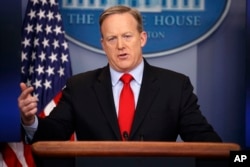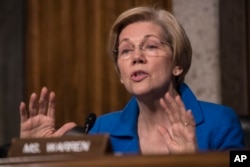President Donald Trump has taken steps aimed at rolling back key financial industry regulations, including the Dodd-Frank Act meant to prevent another banking industry meltdown and a measure requiring financial advisers to act in their clients' best interest.
“Today, we are signing core principles for regulating the United States financial system," Trump said Friday. “Doesn't get much bigger than that.”
The Obama administration implemented the measures to reform Wall Street following the 2008 financial crisis. But the Trump administration has criticized the regulations, saying they do not protect consumers as intended, and are excessively burdensome and counterproductive.
The administration will be “cutting a lot out of Dodd-Frank because frankly I have so many people, friends of mine that have nice businesses. They can't borrow money,” Trump said.
“The Dodd-Frank Act is a disastrous policy that's hindering our markets, reducing the availability of credit, and crippling our economy's ability to grow and create jobs,” White House press secretary Sean Spicer said.
Trump also signed a presidential memorandum directing the Department of Labor to review its so-called fiduciary rule, which was to go into effect in April. The regulation legally requires financial advisers to put their clients' interests ahead of their own.
“The rule is a solution in search of a problem,” Spicer said. “The rule's intent may be to have provided retirees and others with better financial advice, but in reality its effect has been to limit the financial services that are available to them.”
The White House promised to overhaul financial regulation in a way that promotes job growth and protects consumers.
Earlier on Friday, Trump met with a group of economic experts and corporate executives to discuss a range of issues, including ways to promote job growth and lower taxes.
The reaction was swift.
“Donald Trump talked a big game about Wall Street during his campaign — but as president, we're finding out whose side he's really on,” Democratic Massachusetts Senator Elizabeth Warren said.
The American Bankers Association (ABA) lauded the measures.
Rob Nichols, ABA president and CEO, called the financial regulations “highly prescriptive,” causing the industry to face “tremendous headwinds” while trying to meet customers' needs.
“We appreciate the administration's support for pro-growth policies so banks can go even further in helping communities and our economy thrive,” Nichols said.






